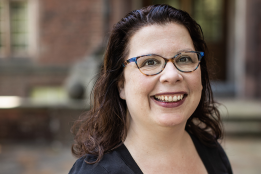Effecting change for the next generation
“Mount Holyoke has truly prepared me for this next step. My professional experience and coursework at the College taught me how to apply these concepts in the real world to effect change. My experience has given me the confidence to go and do that.”
Since the start of her collegiate career, Vivi Corre believed the fields of psychology and education go hand in hand. “I came in knowing I wanted to focus on those two disciplines,” she said. “I was interested in working with students in a school setting and also understanding the way development and childhood psychology play a role in a student’s educational experience. I was thrilled that those interest areas were together at Mount Holyoke.”
Graduating with a degree in psychology and education, plus a Five College Certificate in Culture, Health, and Science, Corre’s time on campus has been peppered with courses that have shown her the variety of avenues she can take with her degree.
She’s taken Childhood and Adolescence in the United States, which focused on school systems, immigration and other political factors shaping the way young people experience education in the United States, and the Sociology of Social Work, which examined social work programs and their efficacy. She was even able to do a semester-long independent study with Professor Kelley O’Carroll, which explored how biographical and narrative identity affects the way teenagers form their identity.
Corre says these courses have shaped her understanding of what children are currently experiencing socially, emotionally and educationally in classrooms across the country. It also solidified her belief that it isn’t enough for students to only receive support in what they’re learning in their courses throughout their K–12 education. Developmentally appropriate practices need to be implemented as well.
“There is so much happening during childhood and adolescence, and there needs to be more people who are thinking from that perspective,” Corre said. “High schoolers aren’t mini adults. They are going through their own particular challenges. I want to be someone who kids feel like they can come to as they navigate that time and the difficult aspects of life. My coursework and my own experience in high school made me realize how important it is to have these sorts of support people in education systems.”
Corre also found joy in the creative writing program on campus, including the College’s memoir writing class taught by published memorist T Kira Madden and the Mount Holyoke Review, where she’s been involved as a web editor and serves on the board.
What she’s loved most about her coursework is that many of them have been taught by professors who are active in their respective fields and also the small class sizes, which allowed her to connect with her classmates on course materials and on a personal level.
“I have loved working directly with professors,” she said. “Not only are the professors here teaching the course. They’re usually still working in the field of what they’re teaching, or have done research on what they’re teaching, so class discussion goes beyond theory. I’ve learned from people in the field who know the latest happenings about their field. It’s been such an empowering environment.”
Beyond her classes, Corre was able to connect with a psychology lab at the University of Chicago that studies social cognition in children. During the summer before her second year, she interned in the lab, studying language development in children and discovering the various ways language development is impacted by inequalities. Working in a research setting allowed her to realize how she could use research for social good.
In the fall, she’ll begin a master of social work program at the University of Chicago. She aims to pursue the social work route and hopes to be embedded in a school or other community-based setting where she can work directly with students.
“Mount Holyoke has truly prepared me for this next step. My professional experience and coursework at the College taught me how to apply these concepts in the real world to effect change,” she said. “There is a need for people to understand childhood development. My experience has given me the confidence to go and do that.”
